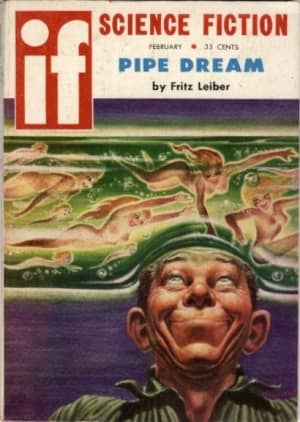Birthday Reviews: Cordwainer Smith’s “No, No, Not Rogov!”

Cordwainer Smith was born Paul Linebarger on July 11, 1913 and died on August 6, 1966. As Linebarger, his most famous work was Psychological Warfare. Frederik Pohl revealed that Smith was really Linebarger in an editorial that ran in the December 1966 issue of Galaxy
Smith was nominated for two Hugo Awards, first for the short story “The Game of Rat and Dragon” in 1955 and later for the novel The Planet Buyer in 1965. His novella “On the Storm Planet” was also nominated for the first Nebula Award. He posthumously won the Seiun Award three times, for his short fiction “Think Blue, Count Two” and “A Planet Named Shayol.” His third win was for the novel Norstilia, which was also a nominee for the Jupiter Award.
“No, No, Not Rogov!,” was originally purchased by Damon Knight and published in the February, 1959 issue of If. Judith Merril included the story in The 5th Annual of the Year’s Best S.-F. and Smith used it in his collection You Will Never Be the Same. Knight reprinted the story in the anthology Science Fiction Inventions and it was one of Smith’s stories in his collection The Instrumentality of Mankind. When Isaac Asimov and Martin H. Greenberg were selecting stories of The Great SF Stories 21 (1959), “No, No, Not Rogov!” made their cut. Jim Mann opened the NESFA Press collection The Rediscovery of Man: The Complete Short Science Fiction of Cordwainer Smith with the story. David G. Hartwell and Kathryn Cramer used it in The Ascent of Wonder: The Evolution of Hard SF. It most recently appeared in the Baen Books collection of Smith’s work, When the People Fell. “No, No, Not Rogov!” has been translated into French, German, Italian, and Spanish.
“No, No, Not Rogov!” is an indictment of the Soviet system. Smith tells about Soviet scientists N. Rogov and Anastasia Cherpas, whose professional competitiveness turns into respect and eventually a scientifically collaborative marriage. Whether or not they actually have any affection for each other can’t be determined from the story, although Cherpas does resent the crush that the scientist Gausgofer, who was sent to spy on them, develops on Rogov.
The story dispassionately describes their research over several years as, sequestered from the political structure of the Soviet Union, they slowly make progress on their goal to send and receive messages directly to the brain, as well as to weaponize the knowledge. Once they reached a certain level of success, Rogov offered himself up as a test subject, at which point things went wrong.
For all that the characters appeared distant, despite Smith’s descriptions of their emotions, when their situation and potential love triangle came to the authority’s attention, it was seen as a betrayal of the system. However the damage had already been done, and it was the quest for knowledge rather than any emotional attachment which really doomed the project.
Reprint reviewed in the collection The Rediscovery of Man: The Complete Short Science Fiction of Cordwainer Smith, by Cordwainer Smith, Edited by Jim Mann, NESFA Press 1993.
 Steven H Silver is a sixteen-time Hugo Award nominee and was the publisher of the Hugo-nominated fanzine Argentus as well as the editor and publisher of ISFiC Press for 8 years. He has also edited books for DAW and NESFA Press. He began publishing short fiction in 2008 and his most recently published story is “Doing Business at Hodputt’s Emporium” in Galaxy’s Edge. Steven has chaired the first Midwest Construction, Windycon three times, and the SFWA Nebula Conference 6 times, as well as serving as the Event Coordinator for SFWA. He was programming chair for Chicon 2000 and Vice Chair of Chicon 7. He has been the news editor for SF Site since 2002.
Steven H Silver is a sixteen-time Hugo Award nominee and was the publisher of the Hugo-nominated fanzine Argentus as well as the editor and publisher of ISFiC Press for 8 years. He has also edited books for DAW and NESFA Press. He began publishing short fiction in 2008 and his most recently published story is “Doing Business at Hodputt’s Emporium” in Galaxy’s Edge. Steven has chaired the first Midwest Construction, Windycon three times, and the SFWA Nebula Conference 6 times, as well as serving as the Event Coordinator for SFWA. He was programming chair for Chicon 2000 and Vice Chair of Chicon 7. He has been the news editor for SF Site since 2002.
What a great strange writer. Would have been the right choice no matter who might have been born on this day, but I didn’t see any other strong candidates.
I will be mentioning, however, a very old, very great, bestseller later today.
If you’re choosing by importance, Smith is the obvious choice. But I could also have selected T.L. Morgenfield, Hugh B. Cave, or Peni R. Griffin, with Roger E. Moore as a nostalgic outlier.
Never heard of Morgenfield or Griffin, but I have a fondness for Hugh B. Cave. And I read a lot of Roger E. Moore’s nonfiction in DRAGON magazine in the 80s.
Griffin published several stories in Realms of Fantasy, some in Pulphouse, Asimov’s, and F&SF, and one in Dragon.
Morganfield was a Sidewise award nominee with stories in Realms of Fantasy, Space and Time, and Paradox, as well as some anthologies and self-published works. Her novel The Bone Flower Throne was originally published by Panverse Publishing.